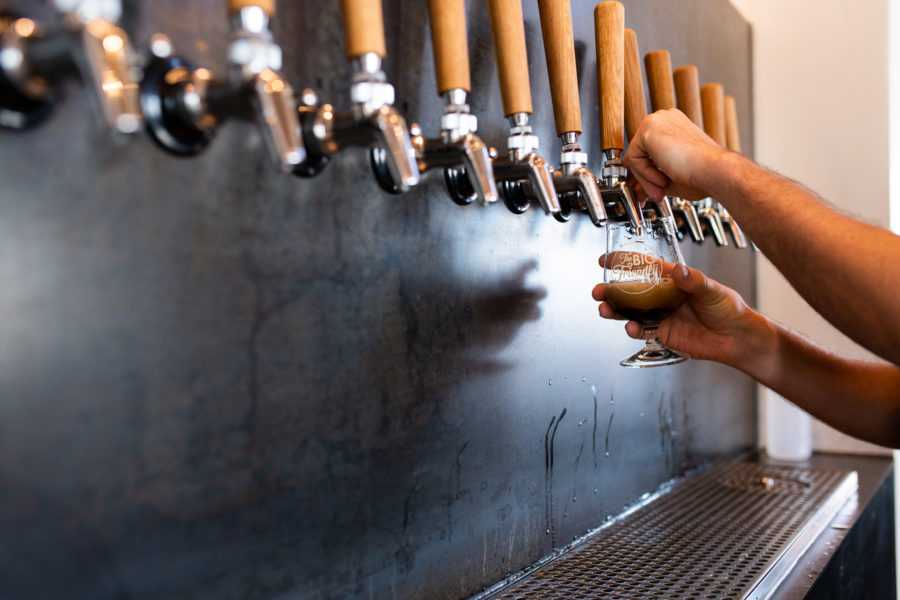If you have ever visited the Wheeler District, it’s likely you have noticed the name “The Big Friendly” extended above rooftops, but the business behind this eye-catching sign is even more remarkable.
The Big Friendly brewery and taproom, now located on Spoke Street in the Wheeler District, began first as a beer bus back in 2015. The business was founded by brothers Joe and Will Quinlin – both experienced in the industry. The Oklahoman tells the story of their journey from catering events at the Wheeler District Ferris Wheel via beer bus to opening a brick and mortar in the heart of Wheeler District.
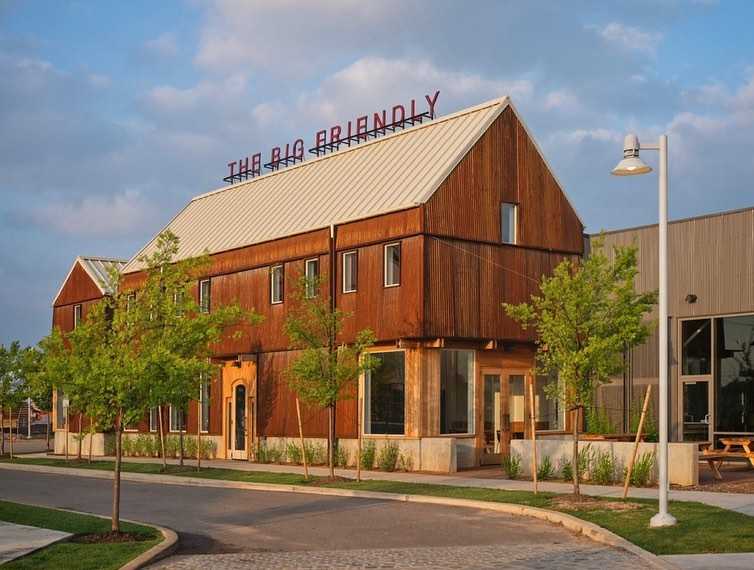
Now the Spoke Street location has been open for nearly two years and has served over 150 unique brews. The brewery also recently won the ULI Impact Award for Boutique Development 2022 which recognizes “…projects that exemplify best practices in the responsible use of land and in creating and sustaining thriving communities through each project’s contributions to the built environment and the public realm.”
The Big Friendly founder and co-owner, Joe Quinlin, answers a few questions about the past, present and future of the business.
The Past
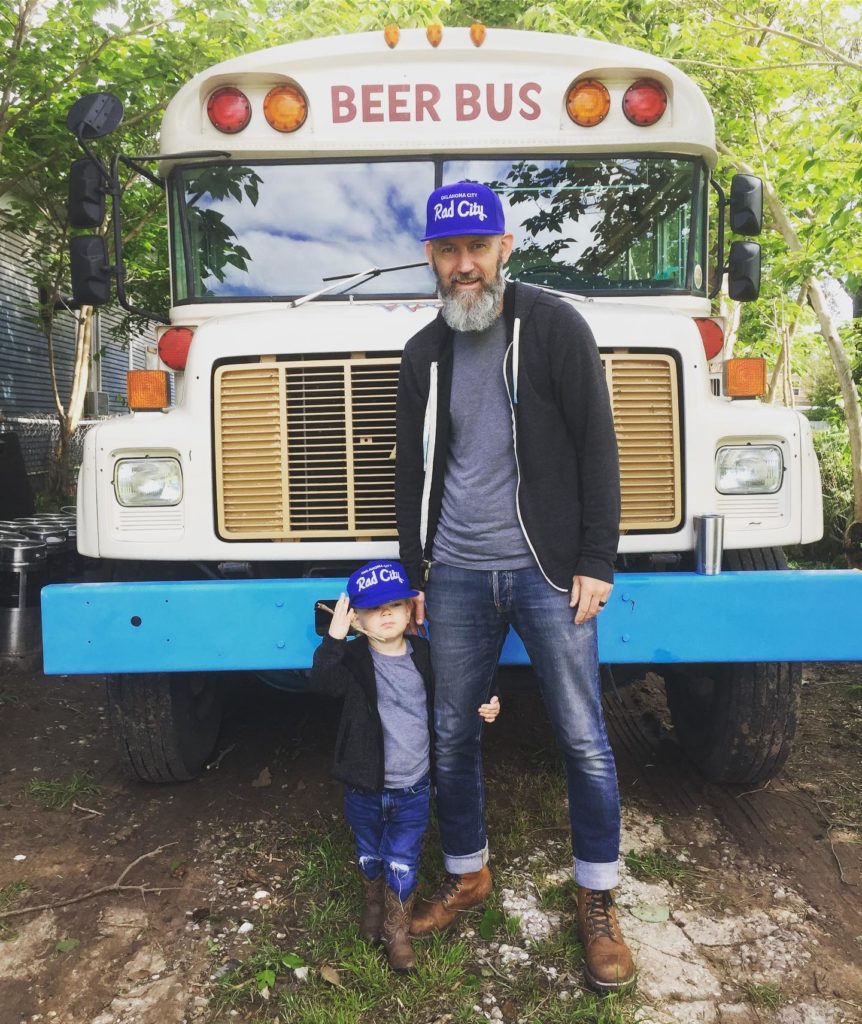
Is there a story behind acquiring the bus?
I was just looking around on Craigslist and was able to find a bus that was from Pawhuska school district. I paid $1,850 for it. That was back in 2014. I drove up there with a few friends, picked up the bus, and then on the way back to OKC it just started smoking out of the back. It was almost getting dark and so we pulled into this autobody shop that was just closing. [The employee] ran out and he looked under and was like, “Your brakes are going out. Your brakes have froze up.”
He had to go home and I was kind of stuck by myself there – not knowing what to do. I called a mechanic friend of mine…and he walked me through [the process], over FaceTime, I ended up cutting the brake lines in the back and plugging the hole and we only had brakes in the front on the way back to town.
It could have been worse.
What was the greatest obstacle and how did the business overcome it?
I felt like there was a lot of peace on the path to opening the business. With that, there were a lot of resources in the form of people that helped me overcome the obstacles. The biggest was trying to figure out the laws related to functioning as a food truck serving alcohol at public spaces. I figured out all the laws…before purchasing the bus. I saw breweries in public spaces selling beer and so I just asked questions. One brewery in particular, Coop Ale Works, they were very open-sourced with information and very helpful in guiding me on how to be within the law – where to go to get permits, how to fill out paperwork, who to talk to. They took me to the city, introduced me to people there, the county, and the tax commission. That made it a lot easier for me, not really knowing how the laws worked, to be able to grasp the understanding of the laws. That was probably the biggest obstacle, I would say.
And then from there it was like, ‘Well is this idea even going to work? Are people going to respond to it well? Are we going to have events? Are we going to be busy enough?’ and after the first year it was apparent that it was going to work.
“…after the first year it was apparent that it was going to work.”
Our first event was at Hoboken Coffee Roasters at Guthrie. Everyone in my family was there working at that event.
How did changing from a bus to a taproom affect the business?
Well the bus was mobile, so we would take it to places and some of those places were monthly events or yearly events and I think the difference now is that we are stationary. This is some place that people have to come to – they have to choose to come here. When we went to events people weren’t necessarily choosing for the bus to be there. They were just happy the beer was there. We were able to be in a unique spot, serving beer to people that we love and we wanted them to learn to love too. [We were] representing craft beer from Oklahoma exclusively in that context.
Now we are able to create our own product. People can interact with us in a different way – in our space. We know that if they come into our taproom they are choosing to be here, because they have to actually come find us. I think that is one of the biggest changes. We still can take the bus and trailer out with our own beer which kind of becomes more of a marketing piece to draw people directly back towards the taproom to come visit us here. The bus was really neat and the fact that it’s a rolling bar – we weren’t a party bus. We wanted this [taproom] to be really unique as well – admirable. I think that with all of the planning and intentional design we had with this space, we were able to accomplish that.
How did moving and settling in the Wheeler District affect the business?
The District for me was more of a risk because of the location. South of the river, south of I-40, a lot of people [who live] north of I-40 didn’t seem to ever drive south of the river. [They] didn’t [think] there was anything for them here and so we were kind of on an island here. I was committing to opening a brewery here before any construction had started on the district. I felt confident that this is where we were supposed to be. Partly because my family and I live across the fence line here about a block to the west of the district. We just knew that we wanted to be in a place where we could walk to the brewery. [Being here] would help in the development of placemaking. We really didn’t have any idea about how people would respond to the development here. It seemed to be a risk for us to take, but South OKC is a place that we love and it’s a place that we moved to on purpose. It just felt like, ‘Yeah, that’s the obvious place for us to build a brewery.’
The ideas behind the development itself were appealing, where it seems like there is more of a focus on trying to encourage people to interact with each other. It’s more walkable, more bikeable, there is smaller private space, bigger communal areas. It’s designed to force people to those common spaces to interact with each other. Little things like the mailroom being right across from where we are at. We are always interacting with people in a very natural way just because of the design of the district. Then of course we had such big support from Blair and Ashley from the beginning. I’ve known Blair since 2008 – a long relationship and a lot of trust there, so they were very accommodating to us. I’ve known Tim at Taco Nation since 1994. That has been fun too, having them across the street, because we have known them for such a long time.
My experience here in Wheeler honestly is the people are just so kind and loving and I think that people have moved here with the intention to know their neighbor, to get outside of their house, and be involved with each other. I know a few families have kids who go to the school here as well which is great. I think that Western Gateway is very unique in the way it is set up – positioned between the two neighborhoods. I think it’s pretty wonderful how that worked out. We love being in the Wheeler District and we love the neighborhood we live in.
The Present
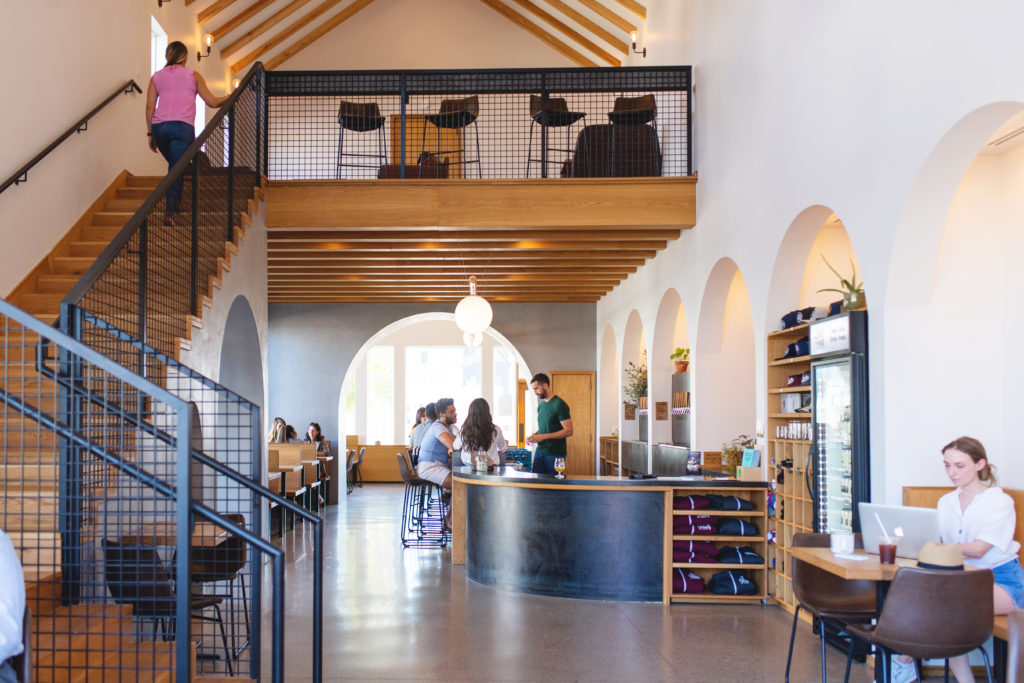
What was/is the mission of The Big Friendly?
I really loved being involved in the community that surrounded Craft Beer. [The community was] a very small, tight-knit community with people who really care about each other and they care about the craft. [I liked the] idea of beer being something that’s not just, ‘Bud Light’, ‘Coors Light’, ‘Miller Light’, or something that you consume in high quantities. There is a mature approach to drinking beer. My goal was to spread the gospel of Craft Beer in Oklahoma and expose people in these small towns or at events that had never interacted with a brewery on a local level.
Also, I feel like there is a beer for everybody. People would tell me ‘I don’t like beer’, and I’m like ‘There is a beer for you’, and eventually there is a beer that I introduce them to that they really liked.
For me, it was just kind of about being able to be involved in this community of people that I really loved being around and then trying to figure out how to invite others into that space as well.
Having a taproom where people really feel at home – a place where we are practicing hospitality, where people feel something different when they walk in the doors and without even talking to anybody – just by walking in the doors they feel a difference here. They see the space that’s really inviting. We really want to be inviting and warm and provide a place where people feel peace.
“We really want to be inviting and warm and provide a place where people feel peace.”
The interaction, not just with our staff, but with what [patrons] are tasting – we just want that to be our goal. The people are the most important aspect of our business: the way we interact with each other here, the way we interact with our patrons, the way the patrons interact with us, and the way patrons interact with each other. We wanted to be very family friendly – friend friendly. Maybe provide a different type of space from what you’d normally see with a craft beer taproom or beer hall.
The Future
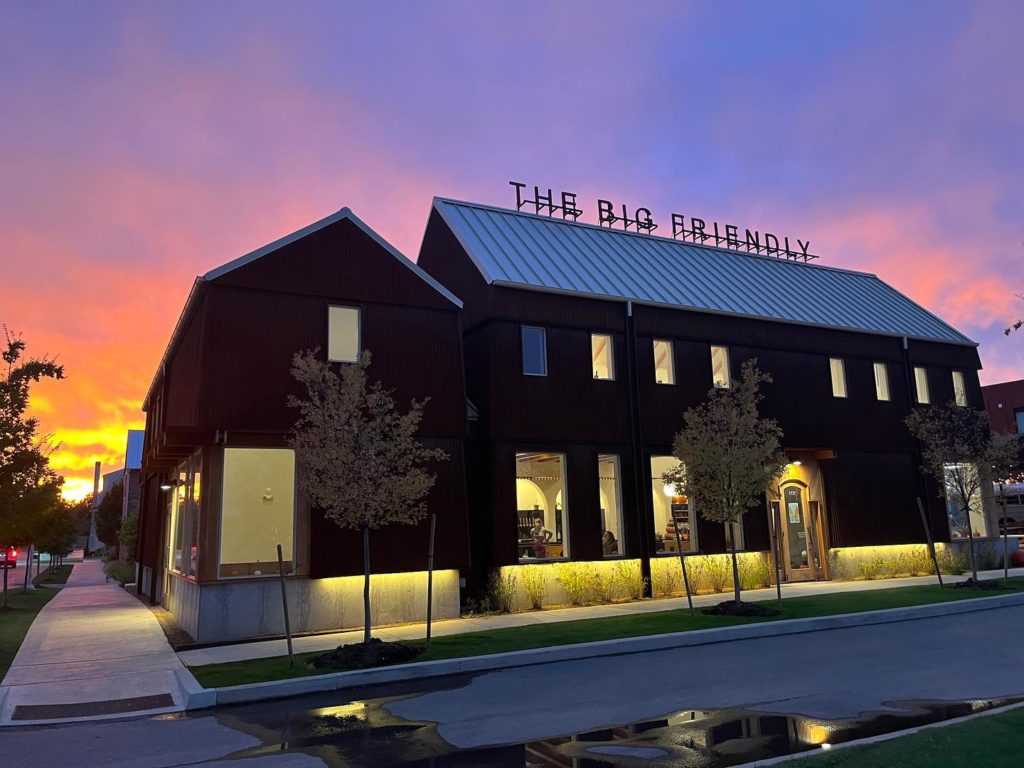
Do you have any big projects coming up?
We are getting a fruit tank in which is basically specifically for making more fruited beers so that’s probably the biggest thing that is next. That is something that has worked well and people have responded to well. It will allow for us to do a little more volume with our fruit ales – making our process a little bit simpler.
We have Joe’s Preserves and we are going to introduce different preserves throughout the year and will probably bring those fruits back every year when they are in season. We did Joe’s Blueberry Preserves last year and will do that again this year. Coming up pretty soon we will have cherry preserves and possibly peach preserves but we will see.
Extras
What is the process of naming the beers and designing the cans?
We just have a list of names and my brother and I just talk about it. Sometimes it goes along with the flavor, sometimes it goes along with the photos.
The photos are all photos we have taken or that friends have taken or it’s a piece of art someone has completed for us. Dome Home is a name inspired by my sister’s house and the picture on the can is her actual house. Hangar House is a pale ale and the name was inspired by my other sister’s house. That was a fun naming process.
Do you have a favorite beer?
I currently really love our Pilsner, Saaz Pils. It’s just a really clean, classic take on a Czech Pilsner. I really like hoppy beer, but I’m getting into more of the Lager and Pilsner types lately.
I feel like our tap list is pretty diverse at any given time. Right now we’ve got a few Lagers, a few Pilsners, a few IPAs, some stouts, a fruited sour, a Saison, Belgian style beers and then we always have wine on draft. So, there is something for everybody.
Any exclusive info you can share with us?
We plan on having the pumpkin patch again this year. We made a big pumpkin stout that we are aging in rum barrels which we will release around the time the pumpkin patch opens.
___________________________________________
The Big Friendly is located at 1737 Spoke St. Oklahoma City, OK 73108. Visit TheBigFriendly.com for business hours and more information or come see Joe and the team in the Wheeler District!
